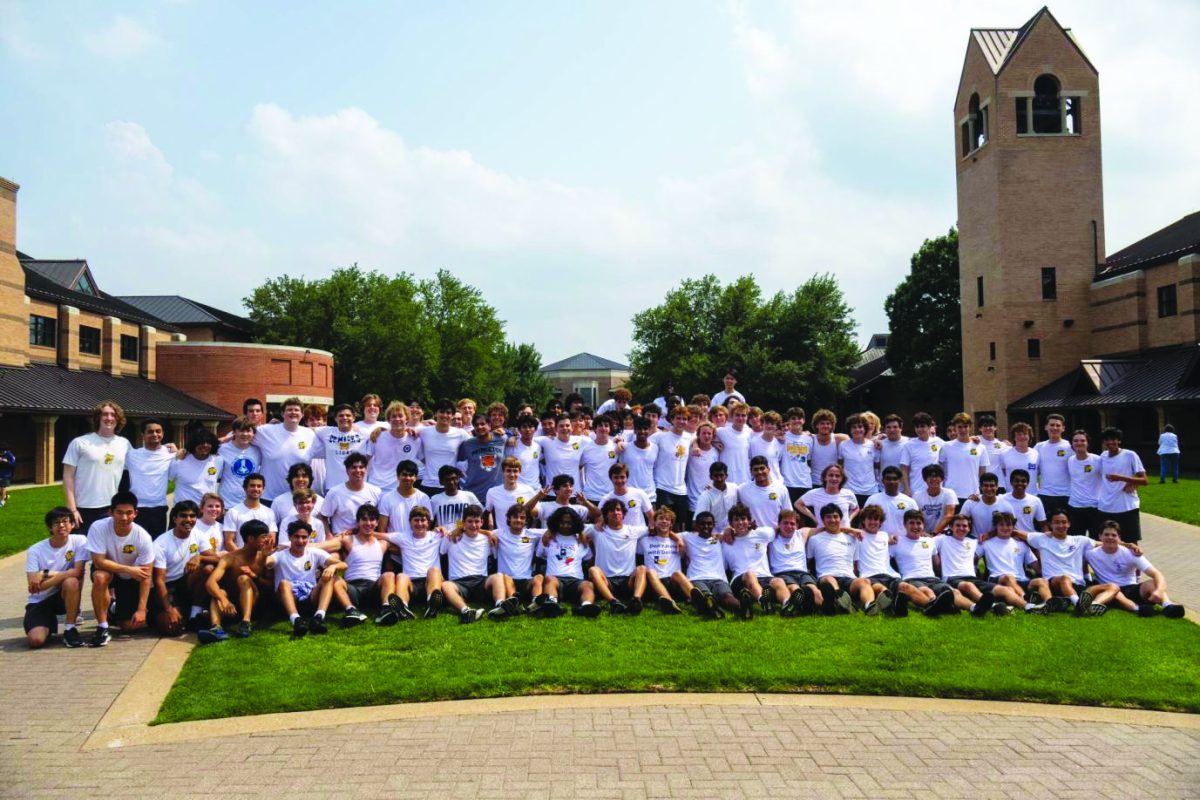The night is dark, but the lights are bright. The calm high-pitched intonation of the choir danced in contrast to the dark tones of the congregation before blending into a pleasant harmony. Proud parents watched with teary eyes as the departing seniors processed between the gathered faculty. A sense of finality and accomplishment hung in the air along with a tinge of melancholy. As Baccalaureate drew to a close, Marksmen could be seen embracing one another and putting the capstone on their career with a tradition nearly as old as the school itself.
The value of positive traditions is readily apparent; they foster a sense of both school identity and brotherhood. By taking part in Baccalaureate, Marksmen join an expansive assortment of alumni, who are all joined together by the same tradition. Some traditions, such as the Pecos Wilderness trip, have their roots in the distant past more than 50 years ago, while others such as the draping of the senior shirts across the school sign, are much more recent. These traditions serve as tangible expressions of the legacies left by those who came before us, and these traditions, as much as any athletic honor or scholastic award, are what we are remembered by.
The last day of senior year is imbued with bittersweet sentiments, all the excitement and anticipation of new opportunities conflicting with the somber awareness of parting ways with friends and family. It is a day for festivities, yet also a moment for contemplation, as one reflects upon the years gone by. The practice of “frocketing,” or the action of ripping the front pockets off underclassmen’s shirts, is a direct affront to the significance of the day and serves as a stain upon a departing class’ legacy. The last afternoon seniors have as students is not spent in a civil manner through chatting with old friends and teachers, but rather filled with the screams of younger students as they are chased, tackled and assaulted by the, supposedly, most mature students on campus.
Frocketing is inherently opposed to what a tradition should be, a reflection of the lasting legacy students have on the school. Frocketing itself is a recent phenomenon, first occurring around the same time as the annual hanging of the shirts, but despite originating at a similar time these traditions could not be more diametrally opposed. Whereas the act of frocketing is a flimsy excuse to harass younger students, the hanging of the shirts is the passing of a figurative torch of responsibility, allowing younger generations to take over the stewardship of the school. The hanging of the shirts is a symbolic gesture that outwardly signifies the passing down of responsibility and tradition, and it encapsulates the spirit of continuity that underpins our school’s character and tradition.
It’s understandable that students find the practice fun; mirroring a game of tag, many underclassmen seem delighted in receiving attention from seniors on their last day of school. But while the practice may be enjoyable for some, it is also detrimental to the civility that underpins the school’s culture. Seniors are supposed to serve as role models for the rest of the school, a symbol of maturity and growth. However, on arguably their most significant school day, they are seen treating the Quad as a football field – chasing, tackling, and tearing pockets off other students. This behavior undermines the symbolic role they are supposed to fulfill.
The solution is quite simple—we need to reflect. As Marksmen, the legacy we leave behind is how we will be remembered; names and awards are hardly remembered after a number of years, but traditions remain, and they stand as the living testament to the collective impact of countless Marksmen who came before us. The legacies of each generation of students blend into each other and shape the traditions that define both the culture of our school and what it means to be a Marksman.
We face a crossroads. Along one road lies the path taken to reach today: the path of generations of Marksmen choosing to leave a positive legacy and with it positive traditions. They have given us countless traditions: the Pecos wilderness trip, the Christmas celebration, baccalaureate, even something as unassuming as McDonald’s Week. It is time to follow the path set before us, put an end to this ridiculous practice, and leave a meaningful legacy to be remembered by.
Marksmen have addressed these issues in the past, such as when the annual senior prank becoming overly destructive. After a particularly disastrous prank resulted in significant property damage, the practice was reformed, making it into the well-loved tradition of today. They made the explicit decision to reroute the destructive energy of the prank into something more inclusive and gratifying. The Class of 2024 needs to follow this example, and reform the act of frocketing into a less destructive, but equally fun tradition. The legacy we leave will consist of the traditions we started, so it’s time to stop assaulting each other and change frocketing into a more productive and enjoyable experience for all.






